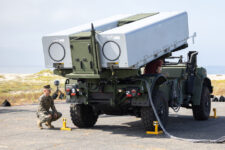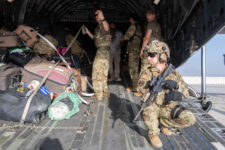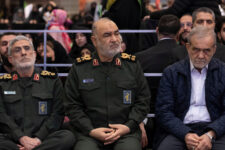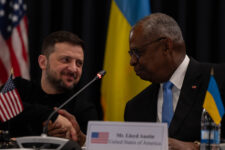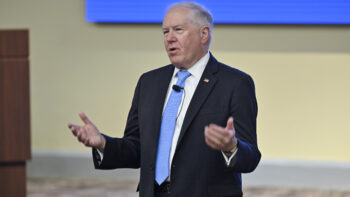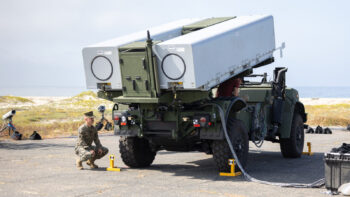 Washington: Failure to fix the way DoD does business on the battlefield will fall squarely on the shoulders of the congressional Super Committee tasked with trimming the national security budget, a former lawmaker said today.
Washington: Failure to fix the way DoD does business on the battlefield will fall squarely on the shoulders of the congressional Super Committee tasked with trimming the national security budget, a former lawmaker said today.
Former Rep. Chris Shays, a moderate Republican, said if the committee does not at least consider adopting the recommendations made by a bipartisan commission on contracting reform co-chaired by Shays, then the congressional panel itself “will be a failure,” he said.
His comments came during today’s release of the final report by the Commission on Wartime Contracting in Iraq and Afghanistan, detailing the tens of billions of taxpayer dollars wasted in DoD-financed reconstruction aid programs in both countries.
Between $31 to $60 billion, or 10 to 20 percent of total contracting dollars spent by DoD and the State Department has been wasted in Iraq in Afghanistan, commission co-chair and former Deputy Director of the Defense Contract Audit Agency Michael Thibault during today’s briefing.
Former DoD Comptroller and commission member Dov Zakheim said the actual numbers were closer to the $60 billion mark, due to outright fraud by contractors and lack of oversight and proper management by the U.S. government.
The problem became so endemic in Iraq and Afghanistan that insurgent forces were sending billing statements to contracting firms, detailing exactly how much it would cost to ensure they would not be attacked during their work, Zakheim said.
These issues were symptomatic of a Pentagon where combat contracting is “not taken seriously,” compared to the department’s top-dollar acquisition programs, commission members claimed.
Emphasizing the point, commission member and former Managing Director for Acquisition and Sourcing Management at the Government Accountability Office, Katherine Schinasi said the commission’s figures — put another way — equal nearly $12 million lost per day in war contracting.
These issues, commission members added, were not just a matter of dollars and cents but, “a national security issue of the highest importance” that would not be going away anytime soon.
To that point, Scott Amey, general counsel for the government watchdog group Project On Government Oversight, also warned those losses would not end once U.S. troops pull out of Iraq and Afghanistan.
“Reconstruction and diplomatic missions will not end when troops are withdrawn,” Amey said in a statement. “The government must ensure that it is prepared for the State Department to take over operations, and additional taxpayer dollars are invested, especially as the government continues to rely on contractors to complete those missions.”
Shays admitted that contracting reform represents only a small sliver of the Super Committee’s “mammoth task” to trim between $12 and $15 trillion in defense spending.
Ongoing fiscal belt-tightening on the Hill and at DoD, he added, will also make some of the committee’s 15 “strategic recommendations” for reform tough to implement, Shays admitted.
But Shays noted that several of those recommendations, such as increasing interagency coordination and strengthening enforcement over wartime contracts, can be done by DoD and State without spending any more money.
For their part, DoD has already taken steps to improve wartime contracting “based on the Department’s own analysis”, Pentagon spokesman Col. Dave Lappan said in a statement released today.
Those efforts, he added, took into account previous work done by the Government Accountability Office and department’s Inspector General’s office, as well as the preliminary findings made by the commission itself.
Some of the changes driven by DoD in wartime contracting include increased investigation and prosecution of contractor fraud cases, hiring more people to oversee contracting and monitor instances of fraud and increasing training for soldiers who issue contracts in the field, according to Lappan.
China ‘could beat us to the punch’ to a 6th-gen fighter, Air Force official warns
“It’s fair to say we pay a lot of attention to what the Chinese are doing. And so, not everything that becomes public is a shock,” Andrew Hunter said when asked about new images of purported Chinese fighters. “But having said that, their pace is incredibly fast.”


